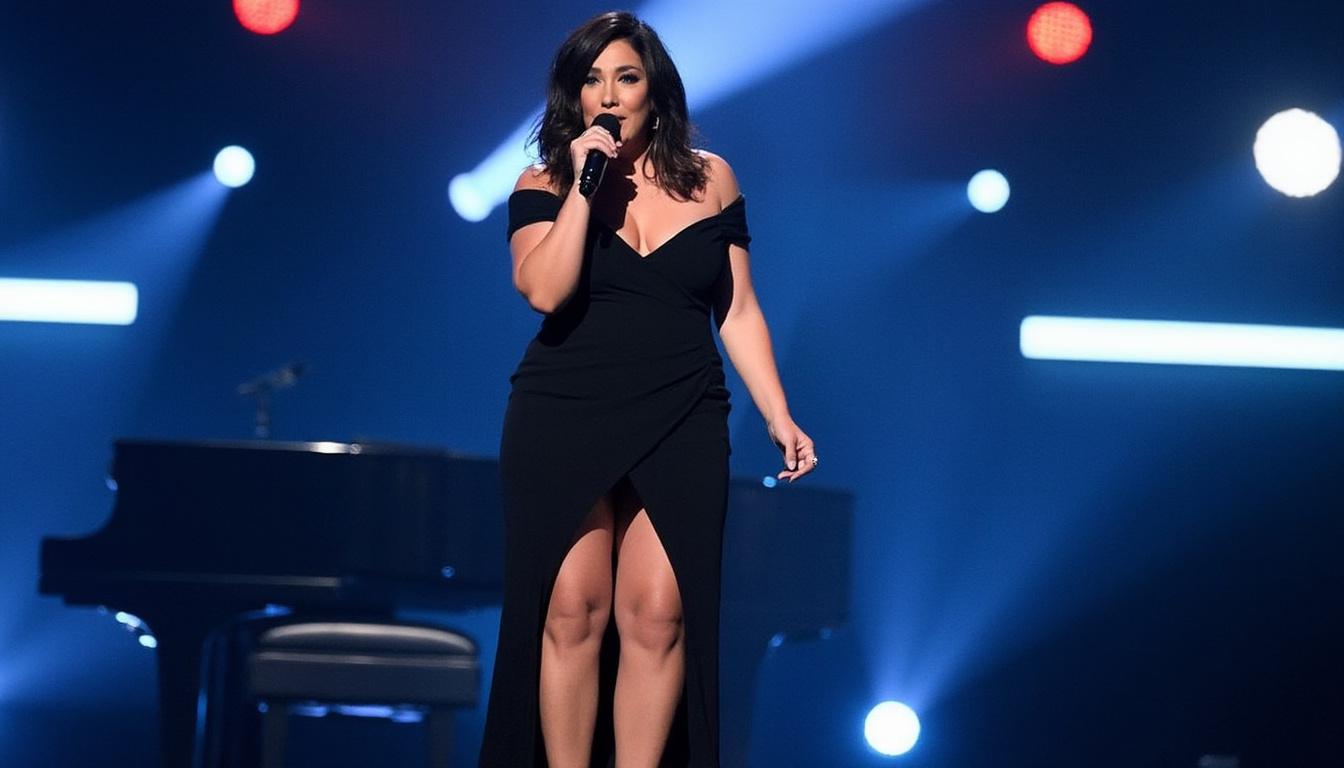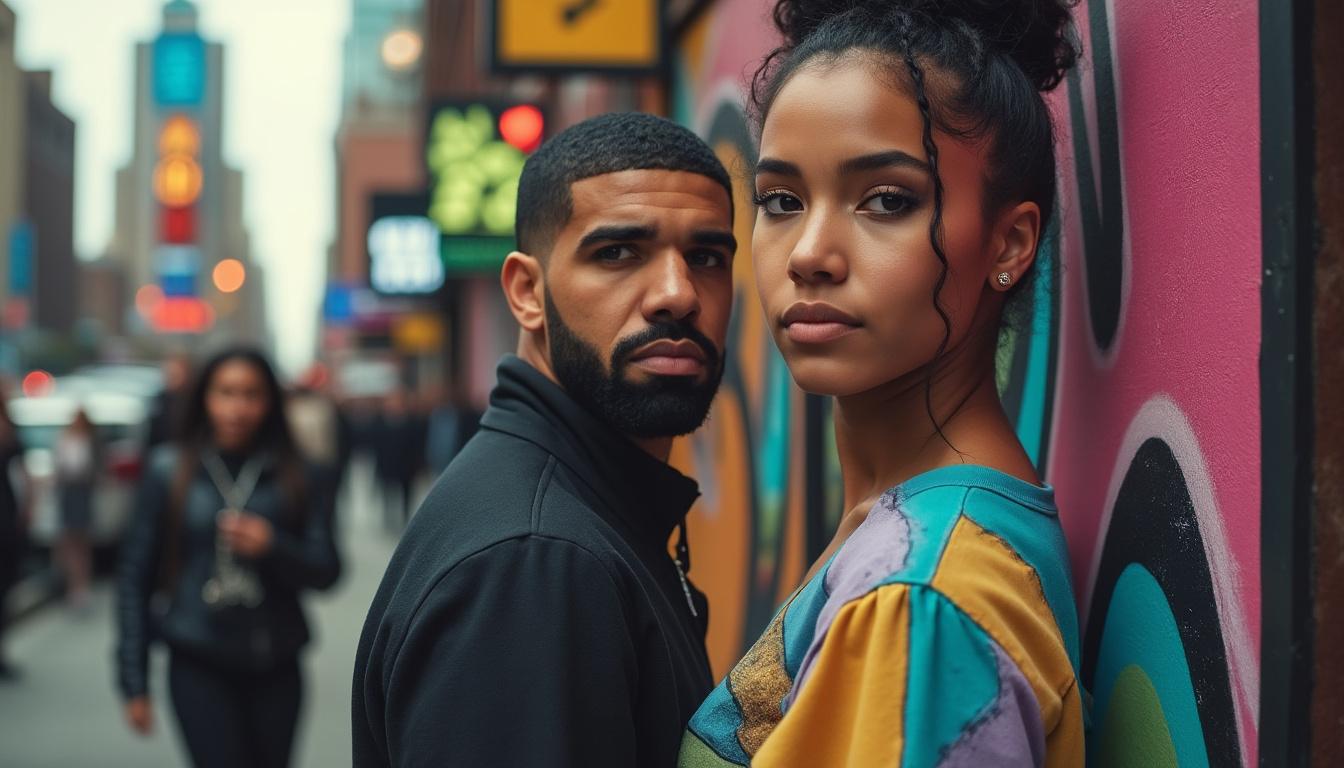In a surprising turn of events, Canadian rapper Drake found himself embroiled in controversy after making an unexpected statement on social media regarding rising pop star Gracie Abrams. His recent Instagram post, which included a striking comparison between his own birthmark and that of the young artist, has raised eyebrows and ignited a fierce reaction from fans and critics alike. Here’s what transpired and why the entertainment world is buzzing.
The Instagram Post That Started It All
On August 4, 2025, Drake took to his Instagram story to share a selfie of Gracie Abrams, who is currently 25 years old, alongside a snapshot of himself during a performance. This seemingly innocent gesture quickly became a focal point for controversy. Drake captioned the post, “I used to hate my birthmark, but Gracie got the same one. Now it’s art.” While some interpreted this as a moment of camaraderie and appreciation, others deemed it inappropriate and cringe-worthy.

The immediate aftermath on social media was nothing short of chaotic. Users were quick to voice their opinions, with a flood of responses that ranged from support to outright condemnation. One individual tweeted, “Whys Drake obsessed with Gracie?” while another remarked, “Drake reposting Gracie wtf wasn’t in my bucket list.” Such mixed reactions reflect the polarized views surrounding celebrity interactions and their implications.
Exploring Public Reaction
The combination of Drake’s age and his choice of subject for the post led to a widespread backlash. Many fans expressed discomfort not only with the nature of the comparison but also with the age disparity—Drake being 38 years old. Comments ranged from humorous to hostile, with some suggesting that the gesture could be seen as overly familiar or even predatory.
- Concerns about the age gap: Critics took to social media platforms to highlight the potential implications of such relationships in the public eye.
- Excessive admiration gone wrong: Some users articulated that while Drake’s intent might have been innocent, the execution felt off-putting.
- Redefining boundaries of celebrity interactions: The post has sparked larger conversations about what is deemed acceptable in celebrity culture.
This incident opened up discussions questioning how celebrities like Drake balance their public persona with personal experiences. While he likely intended to connect on a human level, the execution felt miscalibrated to many.
Gracie Abrams and Her Rising Star
Known for her deeply emotive lyrics and strong vocal presence, Gracie Abrams has been on a meteoric rise in the music industry. Since her debut, she has captivated a growing audience with her authenticity and relatable songwriting. Born into a family of artists, she garnered attention with her debut album, “Good Riddance,” which revealed her vulnerabilities and strong sense of identity.

As Abrams builds her career, the support and criticism she receives from fans and the media are magnified due to her association with high-profile figures like Drake. With the industry increasingly fixating on social media interactions, this incident places a spotlight on how young artists navigate fame and public scrutiny.
The Double-Edged Sword of Celebrity
In the age of social media, celebrity interactions often come with a double-edged sword. While they can elevate an artist’s profile, they also risk misinterpretation:
- Amplification of Success: A mention or shoutout from Drake could provide Gracie Abrams with a substantial boost in visibility, possibly leading to a broader audience.
- Vulnerability to Backlash: Conversely, such attention can also bring unwanted scrutiny, as evidenced by the reactions to Drake’s recent post.
- Navigating Relationships: Young artists must tread carefully when establishing connections in an industry where perceptions can quickly shift.
Thus, while sharing accomplishments and experiences is a treasured aspect of artistic collaboration, it is crucial for those involved to be attuned to public sensibilities. The complexities of fame now necessitate mindfulness in how relationships are presented to audiences.
The Broader Implications of Celebrity Comments
Drake’s comments about his birthmark and his subjective experience trigger broader implications that ripple through the entertainment and social media landscapes. The incident serves as a stark reminder of the responsibilities that come with fame and influence. When public figures use personal anecdotes, the interpretation may vary tremendously, often leading to misunderstandings.

This can result in the need for celebrities to evaluate how they communicate and what messages they send out. In a landscape filled with public opinion, it is essential that statements made reflect sensitivity and awareness.
Drake’s Past Controversies
This isn’t the first time Drake has faced backlash for his interactions with other artists. Previous incidents have consistently reflected the delicate balance between admiration and inappropriate discourse, demonstrating that reactions can quickly spiral out of control:
| Year | Incident | Reactions |
|---|---|---|
| 2020 | Comments on Millie Bobby Brown | Mixed reactions regarding age disparity and context |
| 2021 | Interactions with SZA | Criticism for perceived objectification |
| 2025 | Gracie Abrams birthmark comparison | Backlash for crossing personal boundaries |
As these examples illustrate, the sensitivity around celebrity interactions serves as a reminder of the evolving landscape of social commentary. The intricate nature of public and personal identities turns every comment into fodder for scrutiny.
The Future of Celebrity Engagements and Identity
The intersection of artistry and personality is ever-evolving in the music industry. As public discourse expands and changes, celebrities like Drake and Gracie Abrams will need to adapt to the continuously shifting expectations of social dynamics. Their ability to navigate this terrain could redefine how artists engage with fans and each other.
Shaping Celebrity Identity
As celebrities leverage social media to shape their identities, it is essential to note how they approach shared experiences:
- Authenticity: Authenticity can lead to stronger connections with audiences.
- Self-awareness: Understanding how one’s actions and words are perceived is crucial.
- Responsibility: Being mindful of the implications of one’s statements can mitigate backlash.
As Drake continues his career and Gracie Abrams forges her path in the industry, how they articulate their narratives and engage with their audiences will ultimately shape their legacies within the public discourse.


